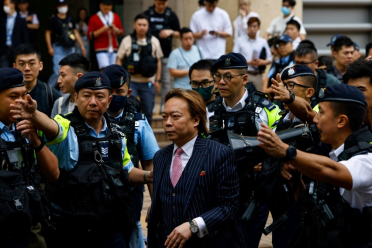
Hong Kong Democracy Leaders Convicted in Landmark Verdicts Since National Security Crackdown
By Fiona Nanna, ForeMedia News UK
Thursday May 30, 2024
More than a dozen of Hong Kong’s prominent democracy advocates were found guilty Thursday of subversion, marking the largest national security trial since Beijing’s significant crackdown on the city.
The 14 activists and politicians were convicted of “conspiracy to commit subversion” due to their involvement in organizing an unofficial primary election in 2020 to select candidates for city legislator elections.
This group was part of the “Hong Kong 47,” a landmark case involving 47 defendants under the national security law that Beijing imposed after the 2019 mass anti-government protests. Most of the defendants had pleaded guilty, but 16 chose to contest the charges in a trial lasting over a year. On Thursday, two were acquitted, while the remaining 45 await sentencing, potentially facing life imprisonment.
The verdict underscores how the national security law has reshaped Hong Kong’s political landscape, virtually eradicating the once-thriving pro-democracy opposition and silencing dissent.
Hong Kong and Beijing authorities argue that the law has restored stability, denying allegations of suppressing freedoms. However, supporters of the convicted assert they were engaged in legitimate political activity previously tolerated in Hong Kong.
The trial, held without a jury, was overseen by judges appointed for national security cases, reflecting the mainland’s legal principles rather than Hong Kong’s traditional common law system. Since the law’s implementation, numerous civil groups have dissolved, independent media has been shuttered, and the legislature is now dominated by pro-Beijing figures.
Among those convicted was Gwyneth Ho, a former journalist known for live-streaming a 2019 attack on pro-democracy protesters, and veteran activist Leung Kwok-hung, nicknamed “Long Hair,” who has been a prominent figure since campaigning against British colonial rule.
Following the verdict, some defendants’ families expressed emotional support in the courtroom. Lawrence Lau and Lee Yu-shun, the two acquitted former district councilors, emphasized the continued need for public attention on the case.
Human Rights Watch condemned the convictions, describing them as a punishment for “peaceful activism” and a sign of China’s tightening grip on Hong Kong.
The case stems from a pro-democracy primary election in July 2020, aimed at optimizing candidates for legislative elections. Authorities claimed the primary was a plot to destabilize the government, leading to the defendants’ arrests and a subsequent overhaul of the electoral system to exclude unpatriotic candidates.
The trial highlighted the severe implications of the national security law, with defendants facing unprecedented legal challenges, such as the absence of jury trials and stringent bail conditions. Critics argue this undermines Hong Kong’s judicial independence, although local authorities have rebuffed foreign criticism as interference in domestic affairs.
As Hong Kong’s political climate continues to evolve under the national security law, the case of the Hong Kong 47 remains a poignant example of the city’s drastic shift from its once-vibrant democratic traditions.

